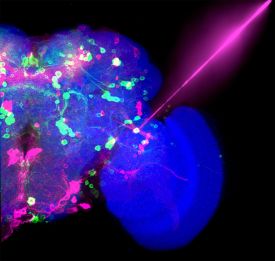
Optogenetics uses light and genetic modification to control the activity of cells in the brain, allowing researchers to precision-target neurons in the brain and study how the activity of these cells contributes to simple and complex behaviours. The technique has revolutionised the study of the nervous system, having helped scientists to better understand how brain circuitry controls a wide range of behaviours including learning, sleep, vision, movement and addiction. It has increased the potential for treating diseases such as epilepsy, spinal injury, multiple sclerosis, and Parkinson’s.

Professor Miesenböck's subsequent discoveries on the neural basis of reward, the regulation and function of sleep, and the control of sexually dimorphic behaviour proved the utility of optogenetics for neurobiological research.
Together with Stanford University's Professor Karl Deisseroth and Humbolt University's Professor Peter Hegemann, Professor Miesenböck will be presented with the Horwitz Prize at a ceremony held in New York on 16 February 2023. They are the 109th, 110th, and 111th winners of the Horwitz Prize, which is awarded annually by Columbia University for groundbreaking work in medical science. Of the 108 previous Horwitz Prize winners, 51 have gone on to receive Nobel Prizes.
The full announcement, including information about the contribution of all three scientists to the field of optogenetics, can be found on the University of Columbia website.
A detailed look at Professor Miesenböck's pioneering contribution can be found on the Medium Blog: "Shedding light on the brain: the dawn of optogenetics".

